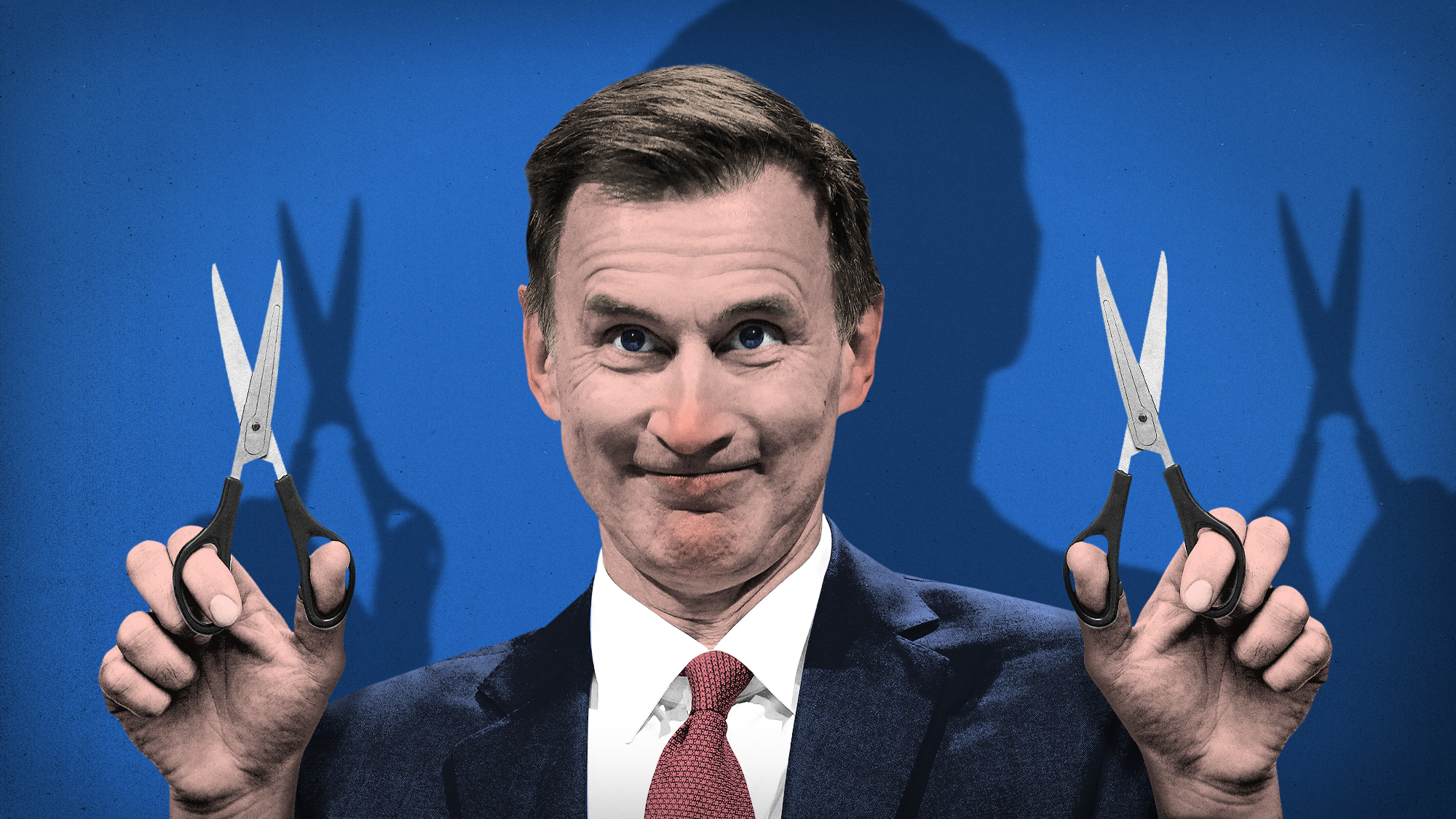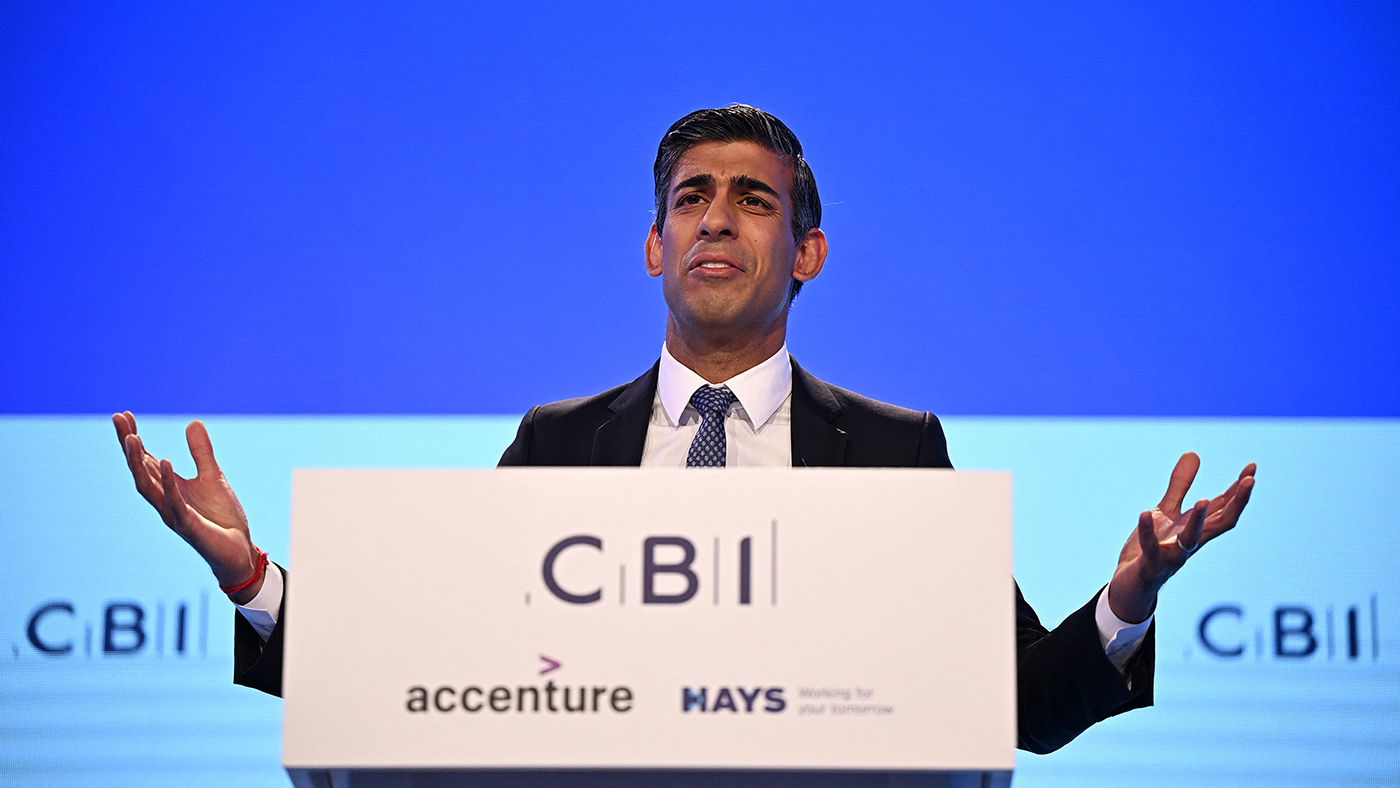Autumn Statement 2016: Real wages will not grow for a decade, says IFS
Think-tank warns of 'dreadful' times ahead, as Resolution Foundation say lower-income families will lose most
A free daily email with the biggest news stories of the day – and the best features from TheWeek.com
You are now subscribed
Your newsletter sign-up was successful
Autumn Statement to help 'Jam' families
18 November
Chancellor Philip Hammond has been ordered by Number 10 to unveil a package of support for so-called "Jam", or "just about managing", families at his first Autumn Statement, says The Times.
The Week
Escape your echo chamber. Get the facts behind the news, plus analysis from multiple perspectives.

Sign up for The Week's Free Newsletters
From our morning news briefing to a weekly Good News Newsletter, get the best of The Week delivered directly to your inbox.
From our morning news briefing to a weekly Good News Newsletter, get the best of The Week delivered directly to your inbox.
Having pledged to lead a government that "works for everyone" and specifically to increase the lot of the "left behind", Theresa May is keen to concentrate spending on a demographic "identified as key to [her] premiership".
Specific target beneficiaries are working households earning £18,000 to £24,000 a year, "a group which struggles to make ends meet but does not qualify for much government assistance".
The Times says "officials have yet to come up with many concrete proposals" and that think-tanks "from across the political spectrum" have been summoned to offer advice.
A big Brexit-related black hole in the public finances will be unveiled next Wednesday and "Whitehall insiders" say this means any support will necessarily be "modest", says The Guardian.
A free daily email with the biggest news stories of the day – and the best features from TheWeek.com
"Policies under consideration including freezing fuel duty for motorists, boosting support for childcare and helping low-income families to save," while Hammond is expected to confirm further increases in the tax-free personal allowance.
The rate at which people start paying income tax increased to £11,000 this year. It was a Conservative manifesto pledge to boost this to £12,500 by the end of this parliament.
The Resolution Foundation, which refers to almost six million working households "just managing" on a net income of between £12,000 and £34,000, says the best way to help is to undo planned restrictions on benefits.
It wants to see a U-turn on cuts to universal credit and the four-year cash freeze in working age benefits. But the government is likely to focus instead on working "strivers".
Hammond is trying to strike a difficult balance between helping squeezed working families, managing an estimated £100bn hit to tax revenues from Brexit and boosting spending to shore up growth.
He is expected to "announce new fiscal rules with a rolling target", says the Times, and to reveal £15bn of targeted infrastructure spending. Hammond could also cut personal and business taxes.
Autumn Statement to 'vindicate' Treasury's Brexit warnings
15 November
Next week's Autumn Statement will "vindicate" the Treasury’s pre-EU referendum warnings on the impact of Brexit on public finances, at the time dismissed as Project Fear scaremongering.
According to the Financial Times, updated official forecasts will show significantly slower growth and lower tax receipts, which will leave plans to reduce and eventually eradicate the budget deficit in tatters.
Chancellor Philip Hammond will show "the borrowing forecast for each year in the Budget last March and the Autumn Statement getting bigger every year", says the FT.
It adds: "The consensus of independent economic forecasts… show mediocre economic growth until 2020 with higher inflation and weaker business investment combining to slow revenues to the exchequer,
"Once converted by the [Office for Budget Responsibility] into likely tax revenues, the deterioration in the public finances will cumulate to around £100bn."
A number of specific policy changes will also contribute to the deteriorating borrowing picture, say official forecasts, including around £5bn in benefits curbs that are less stringent than originally planned and a £5bn hit on the public purse that's put down to a change in the way corporation tax is measured.
Before the referendum the Treasury said that a reduction in growth would result in an eventual £36bn annual hit to the public finances. The Institute for Fiscal Studies estimates there will be losses of £30bn by the end of this parliament.
But Sky News raises doubts about the FT's estimates, which it says "appear to have been calculated from recent reports by the Institute for Fiscal Studies (IFS) and [PwC] rather than a… leak".
Even if the numbers aren't accurate, it's widely assumed that the public finances will take a battering over the coming years and that this will reduce the Chancellor's options when it comes to boosting the economy.
The FT believes Hammond will find "room for some tax cuts to help what officials in Whitehall call 'Jams', meaning families who are 'just about managing'", but says there "will not be much room in the public finances to reset fiscal policy with a big stimulus package".
Up to £15bn to be spent on 'future-proofing' economy
15 November
Philip Hammond could unveil new infrastructure spending of "up to £15bn… in an attempt to 'future-proof' the economy from the turbulence of Brexit", says Sky News.
In his first set piece policy speech, the Autumn Statement on 23 November, the Chancellor is expected to signal a major departure from George Osborne's target of hitting a budget surplus by the end of this parliament.
That's because growth projections have been lowered since the Brexit vote in June. Instead the Chancellor is expected to announce a more flexible fiscal framework to allow for spending to boost the economy.
In another departure from Osborne's approach, Hammond will turn away from "big ticket" developments and instead pump this stimulus into a large number of "small-scale infrastructure projects… to get shovel-ready road and rail links off the ground".
So while HS2 and a third Heathrow runway have been endorsed, Hammond will focus on the likes of the Stubbington bypass in Fareham, which will cost £25m. Sources told Sky News it had "many of the hallmarks of a high-priority project".
The Chancellor believes such investments will "help to get people to work", and that targeted support for high-paying sectors like science and technology will boost poor UK productivity rates.
"Improving productivity is central to Theresa May's pledge to raise living standards for British workers because it makes it easier for employers to lift workers' wages as they get more bang for their buck from employees," says Sky News.
The report comes on the day the Institute for Directors called on the government to set out "targeted infrastructure investment" and tax cuts to boost business investment.
It specifically wants Hammond to "raise the annual investment allowance, which enables businesses to offset purchases of machinery and tools against their profits to £1m, from a current cap of £200,000", says the Daily Telegraph.
Accountancy firm PwC said in its Autumn Statement projections that the scope for tax cuts would be limited – and that they are scarcely needed – because Brexit will "exert a long, slow drag" on a fairly resilient economy, "rather than giving… a short, sharp shock".
"It will not be 'this is the end of austerity'. It will be austerity delayed rather than cancelled," chief economist John Hawksworth told The Guardian.
Autumn Statement could signal austerity to continue past 2020
8 November
Austerity measures will have to continue well beyond 2020 because of a £25bn-a-year hit to the public finances arising from the Brexit vote, says the Institute for Fiscal Studies.
In an analysis of the UK's finances, the think-tank says lower economic growth and higher inflation will reduce tax receipts and offset the majority of any savings gained by leaving the EU, the Financial Times says.
As a result, the previously predicted £10bn surplus by the end of this parliament will be reversed to an annual deficit of £15bn.
Official forecasts from the Office for Budget Responsibility, which have already been handed to Philip Hammond, will be unveiled alongside the Autumn Statement on 23 November, the MP's first set-piece speech as chancellor.
The predicted decline is mostly the result of a £30bn reduction in tax receipts by 2019-2020 related to an expected slowdown in GDP growth, with official projections putting this as much as two per cent lower.
There will also be additional costs related to an expected spike in inflation to three per cent, which will push up spending on pensions in particular.
This means that despite a maximum saving of £8bn from annual spending if all EU budget contributions are cancelled, government spending overall will only be £2bn lower than previously anticipated.
IFS estimates do not take account of tax cuts promised in the 2015 Conservative Party manifesto but not yet delivered, says The Guardian, but do assume Hammond will find the £3.5bn savings from unspecified "efficiencies" promised by his predecessor, George Osborne.
Hammond has said he will adopt a more flexible approach to deficit reduction and allow "headroom" to respond if the economic picture worsens.
But the IFS believes he will need to be "cautious" with regard to new investment.
Thomas Pope, one of the authors of the report, told the FT: "Any decisions to increase spending or cut taxes in the short run should be taken in the knowledge that significant further austerity after 2020 looks to be on the cards."
Autumn Statement: Hammond keeps his powder dry
2 November
Philip Hammond has told Cabinet colleagues not to expect a huge spending splurge at the Autumn Statement later this month, says the Financial Times.
He will instead stick to a fiscally conservative path, scrapping firm deficit reduction targets in order to give himself the "fiscal headroom" to tackle any sharp Brexit-related slowdown in the economy.
The Chancellor will aso respond to calls for an increase in infrastructure spending to boost growth by providing new funding for "shovel-ready" small projects, such as road maintenance.
But according to a source who attended a Cabinet briefing this week, any injection of capital will extend only to the "low billions of pounds a year", well below what some are demanding.
While the Office for Budget Responsibility is likely to show the government will miss borrowing targets , the independent financial watchdog will confirm that spending is "declining gradually", allowing Hammond to say he is "still in the business of deficit reduction", adds the FT.
The Chancellor is expected to set more "lenient rules" for spending. These include, says the paper, increasing the chance of sticking to targets and giving "room to allow the deficit to rise if the economic environment sours".
So far there have been very few hints regarding the tax and spending policies that will be revealed on 23 November.
Writing in the London Evening Standard, Anthony Hilton sets out a number of measures that would achieve Hammond's stated aims of shoring up the economy and boosting low productivity.
Among them is a 2.5 per cent cut in the rate of VAT on goods and services, which would benefit consumers, especially the lowest paid, and take some of the pressure away from the Bank of England's monetary policy.
Hilton also calls for an increase in investment allowances for businesses, more funding for universities and greater government subsidies for businesses looking to export.
More radical suggestions were put forward today by the free-market think-tank the Institute of Economic Affairs, which wants the government to set out a longer-term path to scrapping 20 taxes, including national insurance and stamp duty.
It also wants to see a flat rate of income tax of 15 per cent, VAT reduced from 20 per cent to 12.5 per cent and some of the burden of taxation shifted to property wealth.
-
 The ‘ravenous’ demand for Cornish minerals
The ‘ravenous’ demand for Cornish mineralsUnder the Radar Growing need for critical minerals to power tech has intensified ‘appetite’ for lithium, which could be a ‘huge boon’ for local economy
-
 Why are election experts taking Trump’s midterm threats seriously?
Why are election experts taking Trump’s midterm threats seriously?IN THE SPOTLIGHT As the president muses about polling place deployments and a centralized electoral system aimed at one-party control, lawmakers are taking this administration at its word
-
 ‘Restaurateurs have become millionaires’
‘Restaurateurs have become millionaires’Instant Opinion Opinion, comment and editorials of the day
-
 Five key takeaways from Jeremy Hunt's Autumn Statement
Five key takeaways from Jeremy Hunt's Autumn StatementThe Explainer Benefits rise with higher inflation figure, pension triple lock maintained and National Insurance cut
-
 Would tax cuts benefit the UK economy?
Would tax cuts benefit the UK economy?Today's Big Question More money in people's pockets may help the Tories politically, but could harm efforts to keep inflation falling
-
 Why UK companies are facing a dystopian, zero-growth future
Why UK companies are facing a dystopian, zero-growth futurefeature In prioritising stability, the Treasury risks ‘stifling enterprise and entrepreneurship’
-
 Labour shortages: the ‘most urgent problem’ facing the UK economy right now
Labour shortages: the ‘most urgent problem’ facing the UK economy right nowSpeed Read Britain is currently in the grip of an ‘employment crisis’
-
 Will the energy war hurt Europe more than Russia?
Will the energy war hurt Europe more than Russia?Speed Read European Commission proposes a total ban on Russian oil
-
 Will Elon Musk manage to take over Twitter?
Will Elon Musk manage to take over Twitter?Speed Read The world’s richest man has launched a hostile takeover bid worth $43bn
-
 Shoppers urged not to buy into dodgy Black Friday deals
Shoppers urged not to buy into dodgy Black Friday dealsSpeed Read Consumer watchdog says better prices can be had on most of the so-called bargain offers
-
 Ryanair: readying for departure from London
Ryanair: readying for departure from LondonSpeed Read Plans to delist Ryanair from the London Stock Exchange could spell ‘another blow’ to the ‘dwindling’ London market